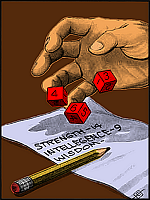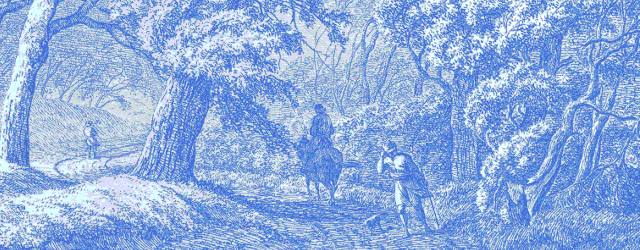Think Outside the Book: How NOT to Role-play Game Mechanics
2 posters
Neverwinter Nights Multiplayer Server 24x7 Now with NWN and NWN:EE :: Neverwinter Nights - General :: General Board
Page 1 of 1
 Think Outside the Book: How NOT to Role-play Game Mechanics
Think Outside the Book: How NOT to Role-play Game Mechanics
Way back when we old folk started playing D&D, there was a special rule... one that largely got ignored and eventually forgotten then dropped from the rulebooks. But, it was a good rule.
For the most part, avoiding this kind of meta-gaming is so far beyond obvious that we don't even think about it, we just do it. I've noticed recently, however, that it has it's limitations. Class, for example... everyone immediately knows who is playing a Paladin. Why? Are they carrying a scroll identifying their membership into a holy order? How do you know they're not a Fighter/Cleric instead? Maybe... just maybe, this Paladin (by class) is nothing more than a devout worshipper who has no formal religious training and was simply "called" to service. By-the-book, he's still a Paladin. In-character, he would NEVER be seen as one. He's not been schooled in Church doctrine. He hasn't been properly trained in combat. He hasn't joined The Grand Holy Order of Generic Stereotype Paladins. He's not been sanctioned or recognized in any way by the ecclesiastical authority of his Deity. In-character, he is NOT a Paladin, no matter what the "class" block on his character sheet says.
Another one is magic items. Take a nice piece of game loot: the Orcthrasher. In game-terms, it's a Longsword+1, +2 vs Orcs. Simple, right? So... how does everyone refer to it, IC? "A magic sword with special enchantments against orcs" To me, at least, that sounds like a vague paraphrase of the sword's game-stats. Wouldn't it be better to describe it as "a finely crafted blade made from the highest quality steel, lightweight with excellent balance and a well-honed edge, perfect for slicing through the fleshy bellies of those damned orc brigands pestering the countryside"? This description has the benefit of being more interesting, it also accurately describes it's function without a single mention of the magic or enchantments which the common non-magic-using lay-person would scarcely understand or even be aware of. Remember, unless you've been specifically informed of it's magic by someone with who understand the properties of magical enhancements, the item has intelligence and telepathically speaks to you, or it has a visible aura (such as 'White Light: 15m'--even then you can explain it away as being highly polished so that it reflects and magnifies even the slightest bit of light that hits it) your non-spell-casting character SHOULDN'T KNOW IT'S MAGICAL! (Admittedly, since NWN never implemented the 'Detect Magic' spell, this last part can be largely washed over, but please don't act like a magic expert if you're not playing one. Please? For me?!?)
Similarly, what is the difference between an Outsider and an Aberration? A studied mage, or a veteran planes walker would learn the nuances and differences... but to that [s]2nd Level Fighter[/s] Warrior entering a Wozard's Tower or an Abandoned Estate for the very first time, they're all "big scary monster things!"
Each level for each class had it's own unique title. A 1st level Fighter was a Veteran, a 3rd level Fighter was a Swordmaster, etc. Naturally you can see why this was not a rule that wasn't commonly used, but it proved a good point. We, the players, are aware of everything on our character sheets... but our characters aren't born with magic scrolls telling us everything they are, or aren't, capable of doing. They don't know their own level any more than they know their BAB.D&D Basic Player's Manual (1983) wrote:Title: Your fighter should use this title when talking with other characters. Instead of saying “I’m Fleetwood, a Second Level fighter,” the character should say “I’m Fleetwood, the Warrior.”
For the most part, avoiding this kind of meta-gaming is so far beyond obvious that we don't even think about it, we just do it. I've noticed recently, however, that it has it's limitations. Class, for example... everyone immediately knows who is playing a Paladin. Why? Are they carrying a scroll identifying their membership into a holy order? How do you know they're not a Fighter/Cleric instead? Maybe... just maybe, this Paladin (by class) is nothing more than a devout worshipper who has no formal religious training and was simply "called" to service. By-the-book, he's still a Paladin. In-character, he would NEVER be seen as one. He's not been schooled in Church doctrine. He hasn't been properly trained in combat. He hasn't joined The Grand Holy Order of Generic Stereotype Paladins. He's not been sanctioned or recognized in any way by the ecclesiastical authority of his Deity. In-character, he is NOT a Paladin, no matter what the "class" block on his character sheet says.
Another one is magic items. Take a nice piece of game loot: the Orcthrasher. In game-terms, it's a Longsword+1, +2 vs Orcs. Simple, right? So... how does everyone refer to it, IC? "A magic sword with special enchantments against orcs" To me, at least, that sounds like a vague paraphrase of the sword's game-stats. Wouldn't it be better to describe it as "a finely crafted blade made from the highest quality steel, lightweight with excellent balance and a well-honed edge, perfect for slicing through the fleshy bellies of those damned orc brigands pestering the countryside"? This description has the benefit of being more interesting, it also accurately describes it's function without a single mention of the magic or enchantments which the common non-magic-using lay-person would scarcely understand or even be aware of. Remember, unless you've been specifically informed of it's magic by someone with who understand the properties of magical enhancements, the item has intelligence and telepathically speaks to you, or it has a visible aura (such as 'White Light: 15m'--even then you can explain it away as being highly polished so that it reflects and magnifies even the slightest bit of light that hits it) your non-spell-casting character SHOULDN'T KNOW IT'S MAGICAL! (Admittedly, since NWN never implemented the 'Detect Magic' spell, this last part can be largely washed over, but please don't act like a magic expert if you're not playing one. Please? For me?!?)
Similarly, what is the difference between an Outsider and an Aberration? A studied mage, or a veteran planes walker would learn the nuances and differences... but to that [s]2nd Level Fighter[/s] Warrior entering a Wozard's Tower or an Abandoned Estate for the very first time, they're all "big scary monster things!"

Gawain_VIII- Posting Knave
-
 Number of posts : 11
Number of posts : 11
Age : 44
Location : Oklahoma, USA
Registration date : 2016-05-31
Character sheet
Character Name: Bel Inconnu
Race: Human
Overall Level: 4
 Re: Think Outside the Book: How NOT to Role-play Game Mechanics
Re: Think Outside the Book: How NOT to Role-play Game Mechanics
Friend Gawain VIII,
Excellent post! Good points.
While any member of the city of Dohral's Highguard are likely to be Paladins, we should craft some notion of what shibboleths various Paladin (and Monk and Priestly) orders would carry and use THAT as the subtle or unsubtle hint of what class a person may or may not be. I would be very open to having any of our DM staff help in developing such orders and their symbols further.
I too like to see more game mechanic obfuscation, and as little game mechanic terminology in-game as is possible as it just helps immersion. I am debating the implementation of a script to obfuscate items by name "Krigmoon's Marvellous Poignard" instead of "Dagger +1". perhaps?
Like you I've pondered the loss of use of those "level names" - I _think_ that the reason they came to disuse in the game rules is this: they ran out of such descriptive terms and with the addition of Kits in 2nd Edition, some of those "level names" became re-used as names for Kits, and later names for CLASSes. I _love_ to see characters using colorful names and such "Ergomile the Arcanist", "Osthelrik, the Adept of the Third Eye", "Grinmarr, Champion of the Effelfen Swamps" and the like are just splendid monikers!
Excellent post! Good points.
While any member of the city of Dohral's Highguard are likely to be Paladins, we should craft some notion of what shibboleths various Paladin (and Monk and Priestly) orders would carry and use THAT as the subtle or unsubtle hint of what class a person may or may not be. I would be very open to having any of our DM staff help in developing such orders and their symbols further.
I too like to see more game mechanic obfuscation, and as little game mechanic terminology in-game as is possible as it just helps immersion. I am debating the implementation of a script to obfuscate items by name "Krigmoon's Marvellous Poignard" instead of "Dagger +1". perhaps?
Like you I've pondered the loss of use of those "level names" - I _think_ that the reason they came to disuse in the game rules is this: they ran out of such descriptive terms and with the addition of Kits in 2nd Edition, some of those "level names" became re-used as names for Kits, and later names for CLASSes. I _love_ to see characters using colorful names and such "Ergomile the Arcanist", "Osthelrik, the Adept of the Third Eye", "Grinmarr, Champion of the Effelfen Swamps" and the like are just splendid monikers!
 Similar topics
Similar topics» THIS IS A ROLE PLAY SERVER...
» Effectively Role-playing Ability Scores
» Non-Standard Builds: A role-playing primer
» In game play
» Game Play Awards
» Effectively Role-playing Ability Scores
» Non-Standard Builds: A role-playing primer
» In game play
» Game Play Awards
Neverwinter Nights Multiplayer Server 24x7 Now with NWN and NWN:EE :: Neverwinter Nights - General :: General Board
Page 1 of 1
Permissions in this forum:
You cannot reply to topics in this forum